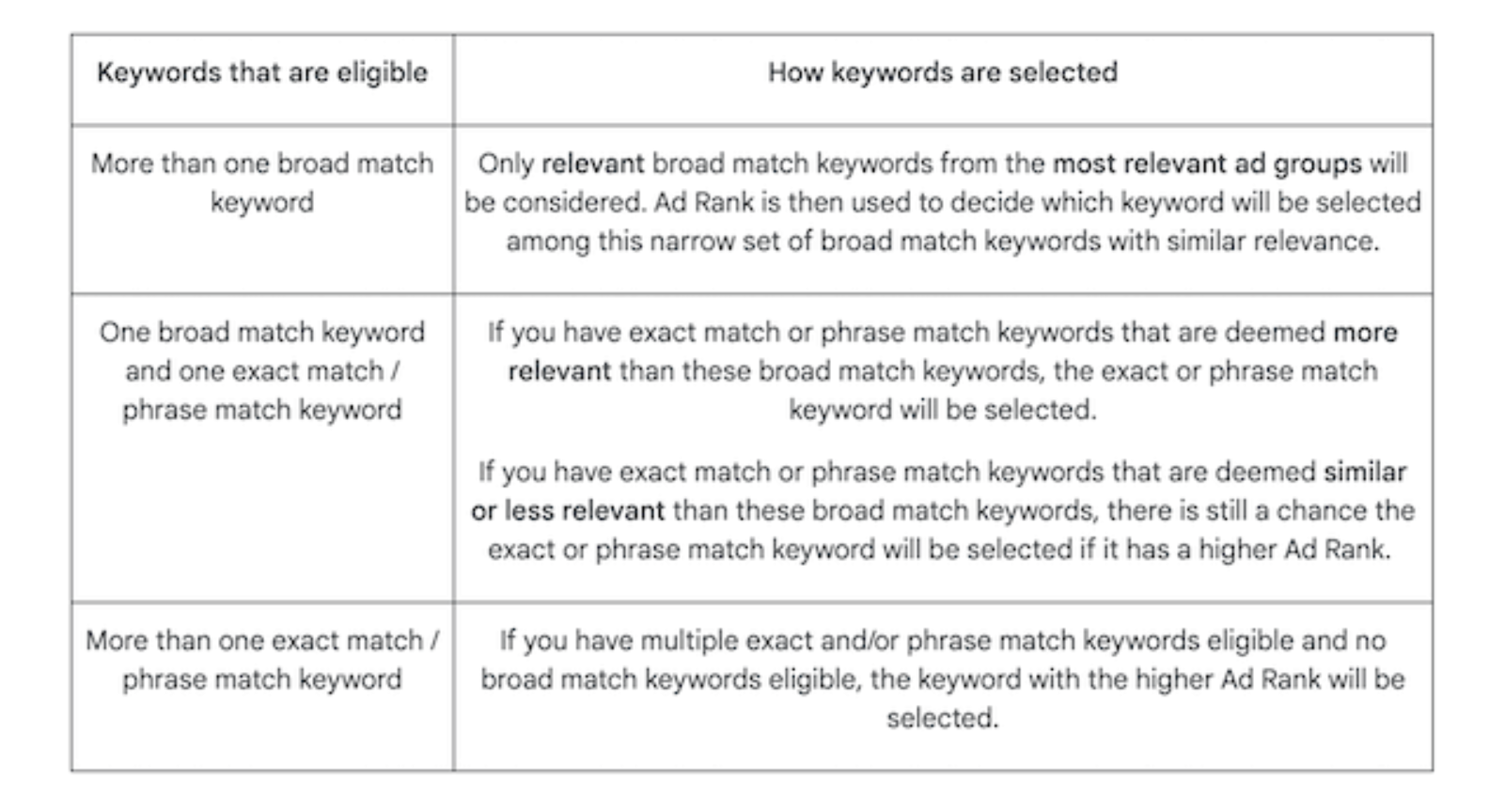In 2022, Google announced that it would simplify Google Ads match types. This post explains what this means and what you’ll need to do to your Google Ads accounts.
Google recently made improvements to keyword matching technology and rules on how it selects keywords in your account.
This Google Ads update is designed to help:
- Control which keywords match a search query.
- Reduce account complexity by giving more control over traffic without managing multiple match types.
- Allow you to attract more qualified and high-performing traffic using fewer keywords easily.
Here’s what Google’s announcement means.
Change: The BERT algorithm has improved keyword matching precision
BERT algorithm technology interprets language, queries, and search intent. This applies to keyword match type behavior. This makes keywords, particularly broad match type, more predictable and aligned with the search intent.
Change: Exact match type data also applies to broad and phrase match types
To understand this change, we need to refresh our memory about some big changes in early 2022. Google retired modified broad match keywords and announced it will prefer exact match keywords that are identical to the search query.
Now the same logic that applies to exact match keywords will apply to broad and phrase match. If your ad group doesn’t have an exact match keyword that is the same as the search query but has broad or phrase match keywords identical to the query, Google will prioritize the broad and phrase keywords that exactly match the search query.
Here’s an example:
If someone searches for house buyers near me and you’re targeting broad match house buyers and broad match house buyers near me, the identically matching broad match keyword house buyers near me will be preferred unless you’re targeting exact match house buyers near me, in which case the exact match will be served.
Change: If you have multiple keywords and match types that are relevant, but not identical, to the search query, Ad Rank will not be the only deciding factor
If keywords are relevant to a search query, but none are identical to it, Google will not just use Ad Rank, but Ad Rank plus other relevance signals to determine the keyword it serves. “Other relevance signals” include the meaning and intent of the search term and the meaning of your targeted keywords based on their associated landing pages.
Here’s an example:
If someone searches “fast house buyers near me” and you are targeting the phrase match fast house buyer and the broad match house buyer, Google will select the phrase match keyword because it’s more relevant, even if it has lower Ad Rank than the broad match keyword.
Google states, “These rules ensure that the most relevant keyword will always be prioritized, so you can more easily use broad match and still maintain control.” Google provided the chart below to illustrate this logic.

Additional Points
Previously, we’ve directed members about using the same keywords with multiple match types to identify the highest-performing keywords. Google is saying this is not necessary any longer.
You can get more “qualified” traffic using fewer keywords
This is only what Google is saying. With these improvements, it’s possible to maintain better control over which keywords match a query. This is especially true with broad match keywords. This should “reduce account complexity” and eliminate the “extra work” of using multiple match types to control where traffic goes in your account.
You should create “thematically” consistent ad groups
Google suggests to “group keywords into thematically consistent ad groups so your ads will serve from the ad group you expect them to.”
A basic example can be, if you’re an investor and inherited and cash are your most popular searches, you would create two ad groups:
- One ad group with creatives for selling an inherited house.
- A second ad group with creatives for selling for cash.
If you’re pairing broad match keywords with a Smart Bidding strategy, there’s no longer a benefit to using multiple match types
What this means is that since broad match keywords are now more precise and predictable, plus they now follow the same logic as an exact match, you can target the appropriate broad match keywords and get the same results as you would if you targeted the phrase and exact match version of that keywords.
Google says… “Also note that when you use broad match with Smart Bidding, there’s no benefit to using the same keywords in multiple match types. Broad match already covers the same queries and improves performance with real-time bid optimization.”
What Does This Mean for Real Estate Agents and Investors?
Test different match types. Even going as far as creating broad match experiments.
We’ve always recommended taking Google’s messaging seriously but also with caution. Historically, broad match keywords have caused more wasted spending in real estate campaigns than they have lead generation.
If what Google is promising, broad match keywords might be the future. Just monitor your account and make adjustments to keep quality searches high.
Changes to Consider Making Now
To help you get the most out of these upcoming changes, we suggest the following best practices:
- Monitor performance and shift budgets where necessary: Traffic may fluctuate due to these changes, so make adjustments as needed.
- Regularly check your “Recommendations”: Check the “Add new keywords” to maintain keyword coverage and “Remove redundant keywords,” which helps you consolidate duplicate keywords.
- Continue to use negative keywords: Exclude matches you don’t want with negative keywords.
Moving Forward
We’ll monitor these new policies and send updates as they become available.
For now, it’s important to be aware of these changes. This at least gives you an idea of what some recent changes mean.